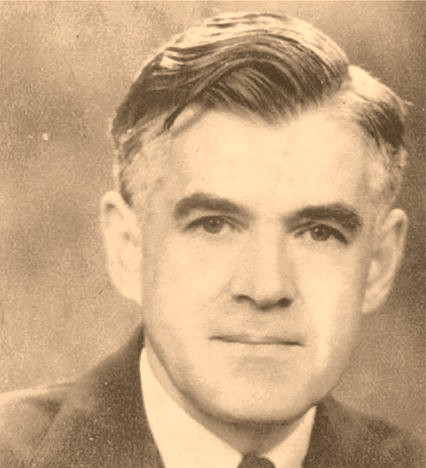“There was always a faint tremor underneath one’s feet, in the air one breathed. As if the volcanoes far to the south were stirring ominously in their sleep.”
–Murder on the Tropic
Salvage is an occupation rife with foolhardiness and hope. There’s a staggering amount of junk down there out of sight—rusted hulks, baubles, skeletons, old shoes—and bringing it to the surface takes herculean effort. But great finds wait as well. Ask any treasure hunter.
Published in 1935, Vultures in the Sky was Todd Downing’s third novel, following upon Murder on Tour (1933) and The Cat Screams (1934), the latter having won wide acclaim for its fair-play plotting and atmospheric writing, and for its warm embrace of the Mexican landscape and Mexican folklore, all of which became fundaments of Downing’s work.
His active career as mystery writer would run only eight years and span nine novels, seven of them with the same character as those of the first three, US Customs Agent Hugh Rennert. Night Over Mexico in 1941 was the last. A “towering, important novel of Mexico in the early 1820s” announced by Publishers Weekly for 1942 never appeared.
 Author Todd Downing
Author Todd Downing
Todd Downing was born in 1902 at Atoka, in Indian Territory that’s now Oklahoma, of direct Choctaw ancestry. He received bachelor’s and master’s degrees from the University of Oklahoma, studying Spanish, French and anthropology both there and at the National University of Mexico. Following graduation he became an instructor at the University while contributing reviews of mystery novels and nonfiction to the Daily Oklahoman and Books Abroad and leading summer tours in Mexico. The cancellation of one of those tours found him writing his own first novel. That novel’s modest success led him to dig in as full-time writer, the acclaim afforded The Cat Screams furthering his resolve. In the Forties, once the wellspring for whatever reasons went dry, Downing worked as an advertising copywriter, then in 1954, following the death of his father, returned to Atoka to live with his mother, teaching Spanish and French at Atoka high school. Later he taught the Choctaw language at Southeastern Oklahoma State University.
The time in which Downing wrote was a transition period, as the classic mystery scrunched over to make room at the table for evolving new forms—some of them comic, some less stylized or more patently realistic, others simply oddball—and the list of lost and misplaced writers is a long one. Curtis Evans made a fine foray towards remembering Todd Downing with Clues and Corpses (Coachwhip Publications, 2013), balancing a couple of hundred pages of information about Downing and his books with another couple of hundred gathering his book reviews, these latter offering valuable documentation of how the genre was changing even as he brought his own novels into it.
Downing’s work is masterfully carved to the golden age template: stylized plotting; violence offstage and abstract; essential clues carefully placed, carefully biased; feints and end runs; a final escalade. It’s the tension between so formalized style and the darker, deeper substance of Mexican folklore and attitudes that more than anything else can serve to shift Downing’s mysteries into overdrive, especially when lent force by such atmospheric writing as exemplified by the endless rain of Night Over Mexico, or the animal cries prefiguring each murder in The Cat Screams.
“Death’s a gayer partner for him than life itself,” Downing wrote in Night Over Mexico. “He plays jokes on it it just as it plays jokes on him….the Mexican hugs it, sleeps with it, dances with it.”
In Murder on Tour, Rennert plays with a Day of the Dead toy, making “the little skeleton” jump into life in its macabre dance.
And then, of course, there are the vultures, ever circling. When Rennert notes them, ugly blotches moving in downward spirals, round and round, a crew member responds.
“It is the zopilotes.” There was something incongruous about the hollow voice that emerged from the folds of fat about the Mexican’s throat. “I do not like them…. All morning the sky has not been clear of them. It is,” the voice echoed in a shell, “as if they were following this train.”
Vultures in the Sky takes place aboard a train making its way along the tracks from Nuevo Laredo to Mexico City carrying nine passengers, three of whom will survive, along with assorted crew. The novel follows the classic pattern of Christie’s And Then There Were None, serial murders among a small group closely confined, which Downing had employed in The Cat Screams (a house under quarantine) and to which he’d return in Night Over Mexico (a house in the mountains, isolated by violent weather).
Here, the situation is compounded by engine trouble, an impending railway strike, possible sabotage, and a kidnapping. The cars bearing the passengers get uncoupled from the rest, leaving them stranded in the desert, in darkness.
Giving reader and writer, one might add, perfect clearance for ever mounting tension and wonderful portraiture. The reader comes away feeling that Todd Downing was right up there with the best of his time.
Pure folly and conjecture, to ask why Downing’s career as novelist ended after eight years and nine novels. The life of a freelance writer is never an easy one, of course, as warm as it is with insecurities, misadventure, changes in fashion, happenstance, self doubt, and simple inertia. For many it becomes increasingly difficult to rally belief in the value of what we do, and to abide the expense of same.
In his reviews, again and again Downing champions practitioners of classic mysteries, “brilliant variations on the same theme.” The once popular and now forgotten Rufus King, for instance, author of 26 novels and collections, Downing’s “greatest early direct influence” and “the best living writer of mystery stories.” Yet, with all his love for the classic mystery and personal investment in writing them, Downing freely acknowledges the innovations of such as Hammett, Cain, and Jonathan Latimer in their motion towards a more expansive literary aspiration. Maybe this stretching, this reach—changes within the genre itself—hints at Downing’s silence?
Or maybe not.
Downing ends his 1943 essay “Murder Is a Rather Serious Business,” following upon a fairly comprehensive survey of the field, with this sentence: “For, the author should bear always in mind, this is nothing else than the literature of escape.”
Of the classic mystery, of that literature of escape, Todd Downing was unquestionably a master. He constructed his landscapes, his vast deserts and tiny towns that are little more than asterisks on a map, his characters’ lives and thoughts, convincingly and with great care, great skill.
In The Last Trumpet, Rennert’s friend Sheriff Bounty refers to a novel that Downing much admired, Susan Smith’s The Glories of Venus.
“Remember this definition of vacilada? ‘Life is the greatest insult that can be offered to a human being,’ he read, ‘and yet if you will only accept that fact, you can manage to enjoy yourself thoroughly a great deal of the time.’ Mexico, huh?”
“Um-huh,” Rennert agreed. “Mexico.”
That awareness, that central node of his fascination with the Mexican spirit, was in everything Todd Downing wrote. He knew also that much of what is the best in humankind comes from the collision and intermingling of cultures. This, too, is everywhere in his work, and another of many reasons it’s so good to have that work back among us.


















